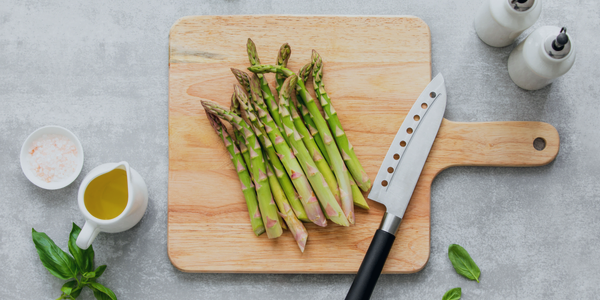
Curious about asparagus nutrition? Look no further! But know that asparagus is not only rich in nutrients that support many aspects of health…
Asparagus is one versatile veggie that can be effortlessly added to your diet in countless ways. From roasted asparagus as a simple side to baked into a frittata, asparagus recipes are ample.
Read on to learn not only how asparagus benefits the body, but how to cook asparagus and effortlessly add it to your diet.
Health Benefits of Eating Asparagus
From supplying essential nutrients to benefiting bone health, asparagus has many health benefits. Learn about the top six health boosts this green vegetable can offer.
1. Benefits Bone Health
As an excellent source of vitamin K and a good source of vitamin C, asparagus can benefit bone health. Vitamin K helps increase bone mineral density and has been studied for its ability to reduce fracture rates.
Additionally, vitamin C promotes collagen production which benefits the bone matrix and adds antioxidant potential.
2. Supports Blood Clotting
Vitamin K, which half a cup of asparagus fulfills 57% of the recommended dietary intake (RDI), is an essential nutrient for blood clotting.
3. Supplies Essential Vitamins and Minerals
In a half a cup of cooked asparagus, there are only 20 calories. However, there are many vitamins, minerals, and other nutrients! It's a great choice for people looking to enrich their weight loss journey, or simply aiming to squeeze in more nutrients in their diet.
A frontrunner among asparagus vitamins is folate that's vital to many body processes—like pregnancy, cell growth, and DNA formation. Specifically, folate/folic acid is essential for preventing and reducing the risk of neural tube defects.
Asparagus also contains the following vitamins in varying amounts and makes an excellent addition to the diet:
• Vitamin A
• Vitamin B2 (riboflavin)
• Vitamin E
In addition to vitamins, asparagus supplies many minerals that add nutrient richness to the diet. Including asparagus on your plate adds the following minerals as well:
• Copper
• Iron
• Phosphorus
• Potassium
• Zinc
4. Promotes Gut Health
You likely already know that dietary fiber is an important part of your diet. However, you may not know what a good source of plant fiber asparagus is (with almost 2 grams in every half cup)!
Additionally, asparagus has been used historically as a natural laxative and diuretic in medical settings. It is more recently been noticed for containing inulin—a prebiotic digestive aid.
How to Use & Cook Asparagus
Asparagus is a fresh and easy veggie to incorporate into the diet. Not only is it nutritious, but it also comes in a variety of colors. You've probably eaten green asparagus at some point, but did you know it also comes in purple and white?
No matter the color, asparagus is simple to prepare. And with a few quick, go-to recipes, you'll get comfortable in the kitchen in no time!
Roasted & Sautéed Asparagus
Cooking asparagus may seem intimidating for first-timers. However, one of the easiest (and best!) ways to enjoy asparagus is by roasting and sauteeing it.
Simply toss clean asparagus with olive oil and some salt and pepper and form a single layer on a baking sheet. Roast in a 400*F oven for about 10-15 minutes, or until asparagus has reached desired "doneness." For an extra pop of flavor, add a fresh squeeze of lemon juice and/or lemon zest.
No access to an oven or desiring another simple cooking method? Heat a light drizzle of olive oil on a medium pan over medium heat. Add asparagus spears, season with salt and pepper, and sauté asparagus for about 10 minutes.
Don't enjoy asparagus on its own? Try adding it to the following main and side dishes:
• Frittatas
• Pastas
• Salads
• Stir-fries and fried rice
Or, give these additional simple ideas a try!
Fresh From The Farmer's Market
Although it is available year-round, asparagus is prized for its versatility in springtime for bright green recipes. Get it fresh from the farmer's market when things start to warm up and try something new!
The first step is often to decide how you want to serve it — asparagus is great on its own or as an added ingredient to the main dish.
Great On The Grill
Like many other vegetables, asparagus can be great right off the grill. Experiment with different seasonings or switch things up by adding them chopped to a kabob.
With a simple set of tools and techniques, grilling vegetables like asparagus can be a welcome change from the norm.
Dive Into Dips
Asparagus is delicious when paired with healthy dips. It's a versatile veggie that goes well with lots of other flavors. Let fresh herbs inspire your next asparagus pairing.
Asparagus Benefits: Final Takeaways
As you can see, asparagus is not only delicious but carries a lot of health benefits along with it. It's a superstar veggie on its own, but also makes a supportive companion to many other dishes.
Try it today fresh, frozen, or tossed into a stir-fry—there's really no wrong way to enjoy it!
References:
Real Food Encyclopedia | Asparagus. FoodPrint. https://foodprint.org/real-food/asparagus/.
Wolfram T. Make a Fresh Start with Spring Foods. EatRight. Published April 8, 2019. https://www.eatright.org/food/planning-and-prep/cooking-tips-and-trends/make-a-fresh-start-with-spring-foods.







